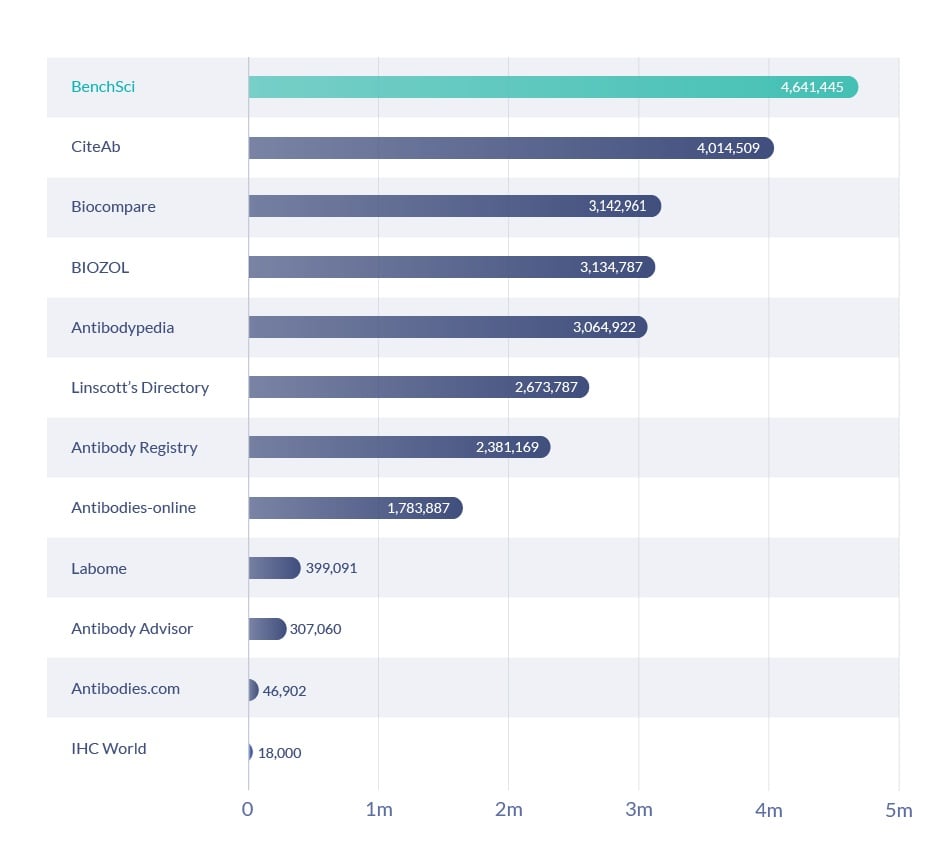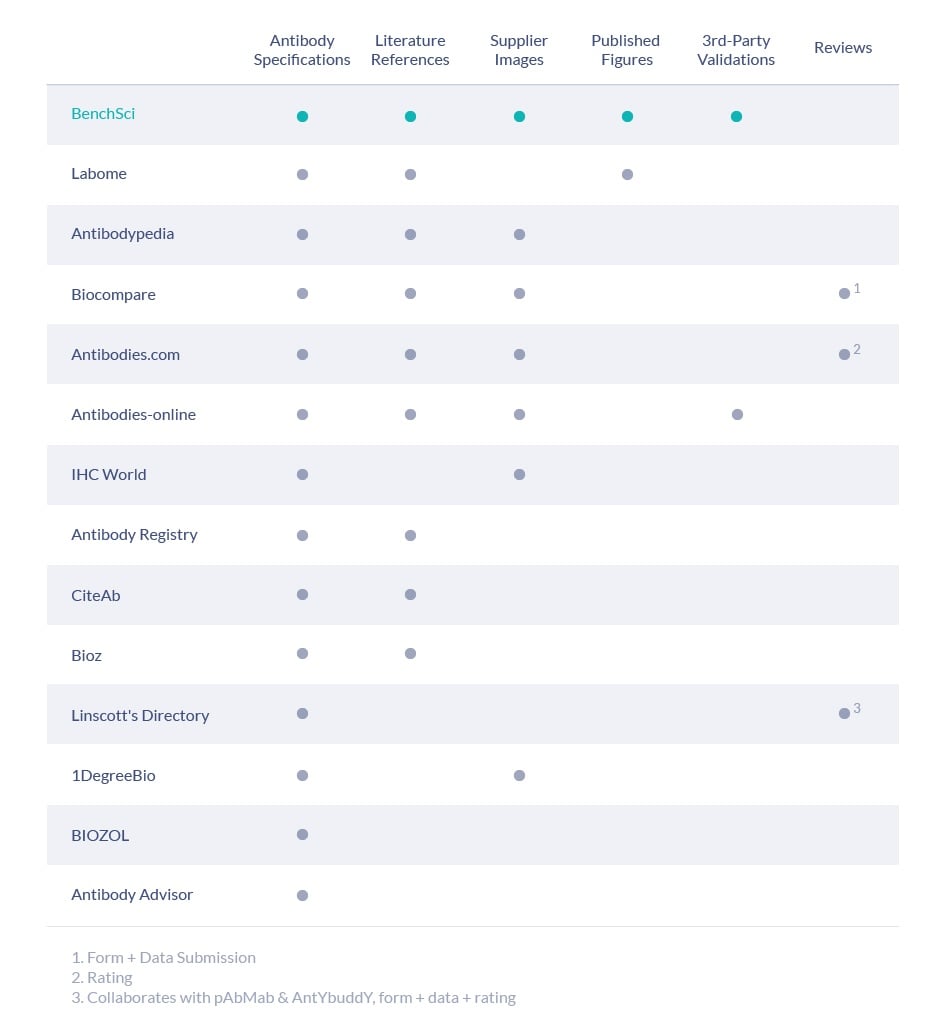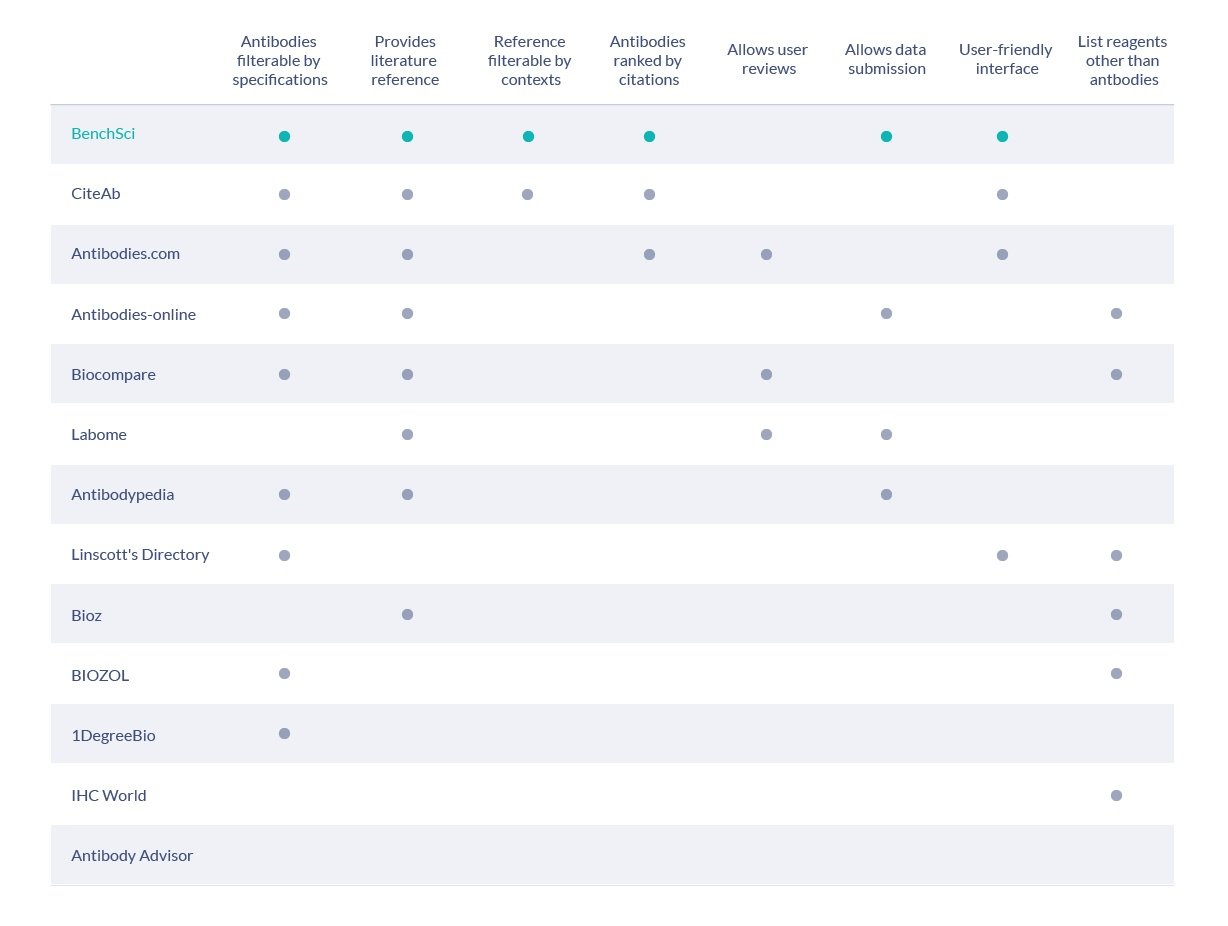If you’re a biomedical research scientist, chances are you have a unique personal story about using antibodies. Not only are research antibodies one of the most commonly used research reagents (88% of scientists, to be exact), they also play a crucial role in the reproducibility of any groundbreaking research findings.
However, finding the right antibody is like finding a needle in a haystack: There are over 300 antibody suppliers selling over 3 million antibodies, and the successful use of each antibody is highly dependent on the experimental contexts in which the antibody was applied. Moreover, a recent article from Nature reported that approximately 50% of research antibodies do not work as intended, which highlights the importance of conducting proper searches for this critical research reagent.
The current gold standard for antibody search is to sift through papers after papers on PubMed and Google Scholar to find published data that supports the use of antibodies. However, these databases were designed to help scientists keep up to date with the latest findings, not for antibody search.
Fortunately, several “antibody search engines” have been developed to help research scientists more easily identify antibodies best suited for their experiments. This article aims to provide an in-depth analysis of the options available so research scientists can take advantage of these resources. These will be introduced in alphabetical order and analyzed by:
- Number of antibodies (Figure 1.)
- Types of data available (Table 1.)
- Pros and cons (Table 2.)
- Uniqueness
Number of Antibodies in Database
Figure 1: Comparison of number of antibodies in databases. (Updated: Sept 17, 2018)
* Accurate numbers for Bioz and 1DegreeBio not available.
Types of Data Available in Database

Table 1: Types of data available in each search engine. (Updated: Sept 17, 2018)
* 3rd-party validations refers to data produced by non-profit groups such as Human Protein Atlas & ENCODE
Antibodies.com
www.antibodies.com | Size: 46,902 antibodies from 24 suppliers
Antibodies.com is an online marketplace dedicated to serving scientists across Europe. In addition to antibodies, Antibodies.com also provide recombinant proteins and biochemicals.
Pros
- Antibodies are filterable by product specifications
- Lists publications associated with each antibody
- User reviews are available
Cons
- Relatively small database
- Listed papers are not filterable by specific experimental contexts
Uniqueness
- Identifies the same antibody sold under different catalog numbers by different vendors and offers the cheapest price
Antibodies-online
www.antibodies-online.com | Size: 1,783,887 antibodies from 188 suppliers
Antibodies-online is an online marketplace that provides antibody products globally.
Pros
- Antibodies are filterable by product specifications
- Lists publications associated with each antibody
Cons
- Listed papers are not filterable by specific experimental contexts
- Does not contain papers from closed-access journals
Uniqueness
- Has an Independent Antibody Validation initiative that helps scientists validate selected antibodies via Science Exchange
Antibody Advisor
www.antibody-advisor.org | Size: 307,060 antibodies from 8 suppliers
Antibody Advisor is a non-profit association developing a unique platform to enable fast and efficient information-sharing on any antibodies used for research.
Pros
- Antibody reviews are available
Cons
- Does not provide literature references for each product
- Relatively small database
Uniqueness
- It is the only non-profit database on this list
Antibodypedia
www.antibodypedia.com | Size: 3,064,922 antibodies from 76 suppliers
The Antibodypedia database was originally developed in 2008 within the 6th framework EU program, Proteome Binders. It contains information about publicly available antibodies generated by academic or commercial providers that are directed against human protein targets.
Pros
- Lists publications associated with each antibody
- Antibodies are filterable by product specifications
- Allows submission of independent validation data
Cons
- Listed papers are not filterable by specific experimental contexts
- Does not contain papers from closed-access journals
Uniqueness
- Has a scoring system based on the data provided by the suppliers and/or independent labs
Antibody Registry
antibodyregistry.org | Size: 2,381,169 antibodies from 1175 suppliers (both commercial & academic)
The Antibody Registry assigns unique and persistent identifiers to each antibody so that they can be referenced within publications. Founded in 2010, it includes commercial antibodies from hundreds of commercial vendors as well as thousands of individual labs.
Pros
- Contains antibodies produced by independent academic labs
Cons
- The majority of the antibodies lack literature references
Uniqueness
- Supports the Resource Identification Initiative; it’s the only database with antibodies produced by academic labs
BenchSci
www.benchsci.com | Size: 4,641,445 antibodies from 195 suppliers
BenchSci is the newest antibody search engine on this list. Founded in 2015, BenchSci leverages machine learning to read millions of publications and extracts individual published figures showing which and how antibodies were used in the literature. BenchSci received funding support from Google’s AI fund, Gradient Venture, in 2018.
Pros
- Scientists can choose to view a list of published figures or a list of products
- Both figures and products are filterable by specific experimental contexts (2,191,100 published use cases) as well as product specifications
- The published figures can be viewed directly on the platform; links to the original papers are also available
- Also contains validation data from the original suppliers and independent labs
- Provides an overview on how frequent each antibody was used for each technique
Cons
- Still in the process of acquiring data from additional closed-access journals (in addition to Springer-Nature, Wiley, Karger, JAMA, FASEB, ASPET , and PNAS for which BenchSci has data)
Uniqueness
- BenchSci is the only one on this list that provides scientists with the capability of filtering through publication data to find antibodies that have been used under specific experimental conditions
Biocompare
www.biocompare.com/Antibodies/ | Size: 3,142,961 antibodies from 155 suppliers
Founded in 1999, Biocompare is a company that lists a wide range of life sciences research products, from assays kits to biomolecules, from various suppliers. A branch of Biocompare is dedicated to antibodies.
Pros
- Antibodies are filterable by product specifications
Cons
- Does not provide information on how each antibody was used in the literature
Uniqueness
- Also allows scientists to find reagents other than antibodies
Bioz
www.bioz.com | Size: Accurate numbers not available
Founded in 2013, Bioz is another search tool on this list that uses machine learning to break down the usage of antibodies in publications.
Pros
- Antibodies are filterable by product specifications and by keywords in the citations
- Extracts paragraphs from “Materials & Methods” that contain the cited antibodies
- Also lists research reagents other than antibodies
Cons
- The figures from citations cannot be filtered by specific experimental contexts
- Does not contain papers from closed-access journals
- The keywords analyzed are not well-defined
Uniqueness
- Developed its own rating system to rank antibodies
BIOZOL
www.biozol.de | Size: 3,134,787 antibodies from 49 suppliers
Founded in 1989, BIOZOL is an online marketplace based in Germany that provides a variety of research reagents in addition to antibodies.
Pros
- Antibodies are filterable by product specifications
Cons
- Does not provide literature references for each product
Uniqueness
- It’s the only database that provide veteranary diagnostics products
CiteAb
www.citeab.com | Size: 4,014,509 antibodies from 150 suppliers
CiteAb is a biotechnology company spun out of the University of Bath in 2013. Its search engine ranks antibodies by the number of times they have been cited to help scientist quickly find out the frequency of use in the literature for their antibody of interest.
Pros
- Ranks antibodies by number of citations (1,145,519 references)
- Antibodies are filterable by product specifications
- Clean and user-friendly interface
Cons
- Citations not filterable by specific experimental contexts
- Does not contain papers from closed-access journals
Uniqueness
- Generates reports on the “Most Cited” antibodies and their suppliers to help scientists make better decisions and to encourage rigorous antibody validation practices amongst suppliers
IHC World
store.ihcworld.com | Size: 18,000 antibodies from 4 suppliers
IHC world is an online marketplace that provides research products for immunohistochemistry experiments, ranging from antibodies to fixatives to microscopes.
Pros
- Antibody reviews available
Cons
- Publication references not available
- Relatively small database
Uniqueness
- Provides antibodies validated for immunohistochemistry, although the validation data is not shown.
Labome
www.labome.com | Size: 399,091 antibodies from 175 suppliers
Founded in 2009, Labome manually curates antibody applications from selected publications to develop a “Validated Antibody Database.”
Pros
- Lists publications associated with each antibody (50,005 published figures)
- Antibodies are filterable by product specifications
- Also lists a subset of antibodies validated by knock-out studies
- Allows submission of independent validation data
Cons
- Citations not filterable by specific experimental contexts
- Does not contain papers from closed-access journals
Uniqueness
- Highlights antibodies that have been validated in knock-out studies
Linscott’s Directory
www.linscottsdirectory.com | Size: 2,673,787 antibodies from 88 suppliers
Founded in 1980 by Dr. William Linscott, an Immunology professor at UCSF, Linscott’s Directory is the very first antibody database. 37 years later, the database is still up-to-date and also lists non-antibody products.
Pros
- Clean and user-friendly interface.
- Antibodies are filterable by product specifications.
Cons
- Does not provide information on how each antibody was used in the literature
Uniqueness
- Partners with pAbmAbs to facilitate sharing of independent antibody reviews
Conclusion

Table 2: Summary of Pros for each search engine. (Updated: Sept 17th, 2018)
We live in a time where groundbreaking technologies, such as CRISPR and optogenetics, were developed to accelerate biomedical discoveries. Given the central role of antibodies in biomedical research, it is natural for there to also be technologies that can make the antibody search process more efficient, which is the common goal amongst the antibody search engines listed in this article.
While each antibody search engine has its pros and cons, we’re (obviously) biased towards BenchSci, as we’ve devoted the past two years building it specifically to address deficiencies with existing solutions. It’s not perfect, but with feedback from the research community we’re working to make BenchSci the best antibody search solution available. We always welcome any suggestions and comments, and we would love to hear from you!
{{cta(‘45866b5e-25fb-4ecc-9443-1999cc05a27c’)}}